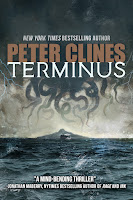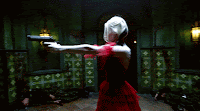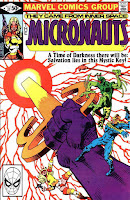Oh, back again so soon? Well, I guess that’s as much on me as it is on you. But I did have another thought I wanted to bounce off you.
This is something I’ve seen several times in books and in bad B-movies, but it only recently struck me what was actually going on. How the storytellers were twisting things in a really unnatural way to solve a problem. So this may make you (and me) look back at some older posts I’ve done in a slightly different light..
But first, let’s talk about pasta.
I got into cooking during the pandemic. Started watching lots of cooking videos. Trying some things that were kind of new and daring for me. Maybe some of you did too. I’ve found all the prep and cooking kept my mind off other things but still working in creative ways. And now I can make really good stir-fried noodles.
Speaking of noodles, you’ve probably heard of the spaghetti test. When it’s cooked properly and ready to eat, you can throw a strand of spaghetti at the wall and the moisture and starches and, I don’t know, pasta epoxy will make it stick. If it isn’t done cooking yet, it just falls off or does a slow downward tumble like one of those Wacky Wall Walkers.
There’s another phrase you may have heard which grew out of this spaghetti test. “Let’s throw it at the wall and see what sticks.” It shows up a lot in the development stages of all sorts of things. We’ve got thirty ideas and we don’t know which one’s going to work? Well, let’s just do allof them. We throw all the spaghetti at the wall—the whole pot—and everything that sticks is good and ready to go and whatever doesn’t… isn’t. Sound familiar?
I think most of us have tried this sort of blunt, brute force approach on something. I know I’ve rewritten conversations severaltimes to see if it works better with Yakko taking the lead, or Dot, or Wakko, or Phoebe, or… who’s that guy? Let’s see what happens if he takes the lead in this. Same thing with names. Holy crap, Murdoch in Terminus went through sooooo many different names. Sometimes for whole drafts, sometimes just for a page or three. But then I found Murdoch and it was perfect.
Thing is, there’s a weird sort of flipside to this. Or maybe an inverse? Freaky mutant bastard offspring? Anyway, I talked a while back about shotgun art, and I think this is what’s going on here.
Sometimes, in books and movies, we’ll see storytellers who just pile on the characters. One after another after another, many of them with only the thinnest connection to the main plot. It’s the cousin of the best friend of a supporting character in one plot thread. Or, y’know, even less than that. I read one story where we spent two whole chapters with a character who’s only purpose was to bump into one of the main characters in a third chapter. That was it. She served no other purpose in the story except to be that two page delay in his day And, y’know, fill out the page count a bit.
What struck me a few weeks back is when storytellers are doing this—layering on dozens of simple, almost stereotypical characters and conflicts—is they’re taking the spaghetti approach and just throwing everything at the wall. Rather than developing any of these characters or elements to any degree, they’re just giving us lots and lots of quick, shallow ones. I mean why spend time making a complex character when I could just create fivecharacters with only one character trait each? It’s so much less effort, right? I mean, ex-wife, former best friend, alcoholic rival, pregnant woman, aggressive military guy—there’s got to be something there that strikes a chord with my reader, right?
That example I gave up above? The woman who served no purpose except to bump into one of the protagonists? She was late for work. That was it. That was her entire character. I mean, she had a name. She had some dialogue. She had a pet in a tank in her apartment (some kind of lizard, I think). But that was it. The only other thing we knew about her—her alarm didn’t go off, she overslept by almost two hours, and she was late for work. We never learned why her alarm didn’t go off (power outage? forgot to set it? sabotaging pet lizard?). We never learned why she was so tired she overslept by two hours (drastically overworked? got blackout drunk? a wild hookup that left her exhausted?).
Heck, weird as it sounds, we never even found out why being late was a bad thing (on the verge of being fired? abusive boss? big presentation?). We just knew she was late, had to get showered and dressed fast, had to get to work, and that was supposed to be enough for us. Anything else would require more thought about who she was, what she wanted out of life, and what she was actually getting.
And this book had over a dozen characters like her. Seriously. It spent a significant amount of time with people who could be 100% completely summed up with things like “Wakko needs some drugs,” “Dot’s worried about her dog,” or “Yakko is a no-nonsense soldier.” That’s it. That’s all of who they were.
One place you may recognize this from (tis the season after all) is old slasher movies. Okay, and some modern ones. Most of the cast is one note characters with just barely enough depth that we can tell the machete went through them. They’re the bulk filler of the plot. The serious woman. The goofball. The jock. The nice girl. The drunk/ stoner. They just exist to be minor obstacles between our killer and the one or two survivors.
Now, again, the idea is that the reader (or the audience, if this is a B-movie) has to find something more-or-less relatable in these broad stereotypes. I mean… you’ve known somebody who’s late for work before, right? Or was a jock? Or a serious woman? Okay, well… I bet you knew someone who was worried about their dog at some point, right?
I think people do this for two reasons. One is that they’re nervous about creating complex characters. Maybe they don’t think they’ve got the skill to do it, or possibly just not the skill to do it in the number of pages allotted to it. Perhaps they think their plot can’t function with only three or four threads. Or possibly they’re worried about having such a limited number of viewpoints.
I think the other reason is they’re worried about having characters with no traits. Like that woman running the register at the gas station. She doesn’t even have a name tag. She’s just there to sell the protagonist gas and a couple snacks. She’s got no arc or backstory or tragic flaw. That doesn’t seem right. We have to give her something, right? Maybe she could be, I don’t know, late for work or something?
Thing is, no matter what my reasoning is for this flood of one-dimensional characters, this always ends up leading to one of two things. Either we mistake their lack of depth for deliberate avoidance (“Hmmmmmm… why isn’t the writer saying why she was up late last night? Is she the murderer???”) and then we get frustrated when this goes nowhere. Or we recognize these characters don’t actually serve a purpose and get frustrated waiting to go back to someone who’s actually going to affect the plot in some way.
I also think it’s worth noting the three traits of good characters I’ve mentioned here a few dozen times—likable, believable, relatable. And yeah, I’ve also mentioned that supporting characters can sometimes get away with only two of these traits. Catch is, when characters are this flat and undeveloped, they almost always end up unbelievable—their actions and reactions just seem ridiculous because there’s no depth to ground them in. So we’re down one good trait already! Then my shotgun approach means they’re going to be randomly relatable at best, and lots of folks fall back on “snarky jerk” as a default personality, soooooooooooooo… Not a lot going for these folks.
Y’see, Timmy, burying my story in simple characters doesn’t work because it’s forgetting a basic truth of the spaghetti test. All those noodles that didn’t stick to the wall? I don’t sweep them up off the floor and put them back in the pot. The whole point of doing it all was to see what did and didn’t work—to figure out what shouldn’t be in my story.
So said noodles definitely shouldn’t be part of my finished entree.
Everyone gets the food-book metaphor here, right?
Anyway… next time…
Wow. Already halfway through October. I guess next time I could do the obligatory horror post. Or maybe talk about NaNoWriMo? Any preferences?
Either way, go write.












